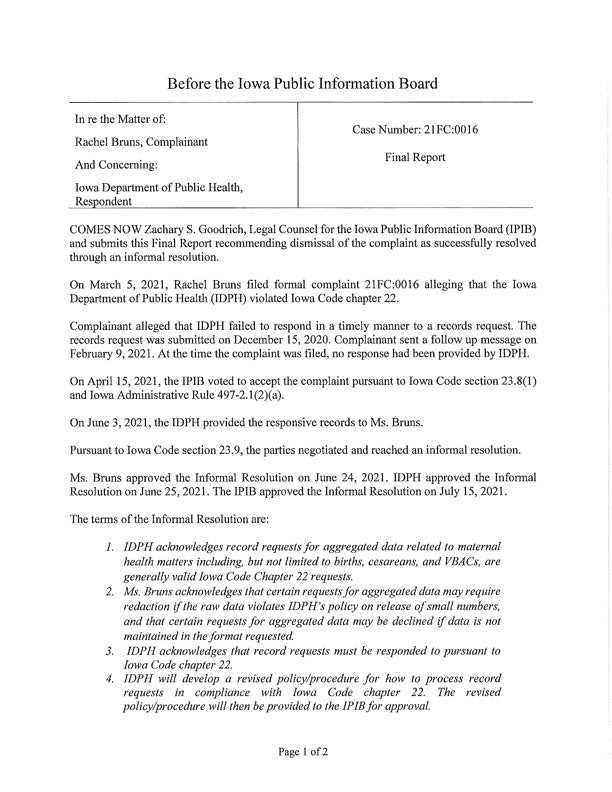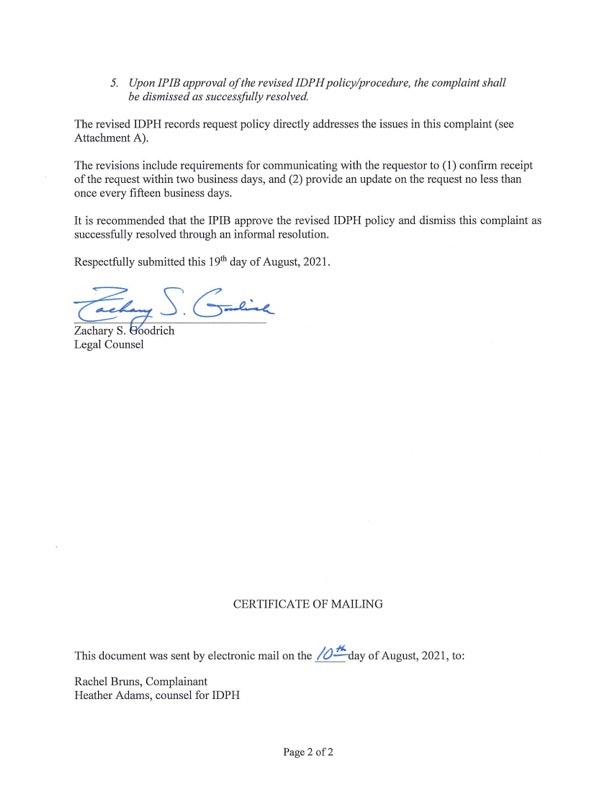Rachel Bruns recounts the saga of trying to obtain records that the Iowa Department of Public Health could have provided promptly.
In an article I wrote for this website in January 2021, Provider practices in Iowa lead to more c-sections, complications, I mentioned that I had requested records from the Iowa Department of Public Health (IDPH) on the number of cesarean births and vaginal births after cesarean (VBACs) in Iowa hospitals.
A lot has happened related to my request since then. I’m summarizing my experience in case it can help other Iowans seeking what should be public information from a government entity.
REQUEST IGNORED FOR MONTHS
On December 15, 2020, I submitted a records request to IDPH seeking the total number of primary cesareans, total number of cesareans, total number of VBACs, and total number of births at each hospital in the state for the most recent year on record. I acknowledged in my email that I understood data would not be released for hospitals with five or fewer births, due to concerns about the ability to identify individual patients.
I received no response or acknowledgement of the request. I waited quite some time to follow up, wanting to provide grace given the holiday season and the realities of the COVID-19 pandemic. I emailed on February 9, 2021, asking for a status update on my request. No one at IDPH acknowledged or replied to that message.
On March 5, I filed a complaint with the Iowa Public Information Board (IPIB), which is charged with enforcing the state’s open records and open meetings laws.
The board’s staff quickly gave my complaint a number, and I forwarded my email correspondence with IDPH to them.
A STRANGE, BELATED RESPONSE
On April 8, IPIB sent me the reply they had received from Heather Adams, the assistant attorney general assigned to IDPH, on behalf of the agency. Adams claimed that because of the “unusual wording of this request,” IDPH needed to review whether I was asking for raw data on individual hospital birth delivery rates. Then, without checking with me, IDPH determined I was requesting “vital records” and raw data, which is confidential per Iowa Code Chapters 144.43 and 135.11.
Adams’ message ended by stating,
The Department therefore requests that this complaint be closed as the requested information is confidential by law. Additionally, as the Iowa Public Information Board has recognized in prior decisions, its jurisdiction does not extend to interpreting or enforcing Iowa Code chapters 135 or 144, and for this reason the Department requests that the Board dismiss this complaint as outside its jurisdiction.
It struck me as strange that the Attorney General’s Office was responding to what should be a routine and benign request for information. Public health departments in some other states post this data on their websites.
I let the public information board’s staff know I was not requesting vital records or raw data. I was seeking total numbers of births by hospital, and the breakdown of mode of birth (VBAC, cesarean). In the recent past, Iowans could make a simple phone call to IDPH and have such data would emailed to them soon after. Now it was being denied without any response to a formal records request, and the Attorney General’s Office had inaccurately determined the data was confidential.
I am proud to have previously worked as a state employee. I believe most state employees are extremely hard working and doing everything they can to serve the people of Iowa. I understand responding to record requests can be tedious and extra work for people who have a lot of other priorities and possibly more important things to do on any given day. I genuinely want to give the benefit of the doubt that there is no malicious intent in not responding or seeking clarity regarding my request.
However, I don’t believe my request was hard to understand by anyone working in public health, nor would it have been time consuming to complete. I know this aggregated data is already compiled, readily available, and contains no vital records/raw data in conflict with Iowa code. It probably would have taken someone a few minutes to find a copy of an existing report with the data I requested in their shared drive and attach it to an email.
Alternatively, someone could have replied to my email and sought clarification. I could have explained that no, I wasn’t seeking vital records. I simply wanted the existing aggregated data or reports with this information.
PUBLIC INFORMATION BOARD COMPLAINT GETS RESULTS
The public information board considered my complaint on April 15. My full-time job has nothing to do with maternal health, so I was not sure if I would be able to call-in to the meeting. I was pleasantly surprised to learn afterwards that the board accepted my complaint. I asked IPIB to consider the following as part of an informal resolution, since IDPH had violated Iowa Code Chapter 22 for failing to acknowledge my request or provide records in a reasonable time frame:
- IDPH would acknowledge it violated the code and pledge to notify records requestors within 15 business days or 20 calendar days whether a request involves confidential records.
- I would confirm I did not seek confidential records. I asked for information that has been compiled into totals or percentages (cesareans, VBACs, total births) and available to IDPH staff. IDPH should provide this information to members of the public who ask for it. The agency stopped providing this information upon request only in recent years.
After some back and forth between the IDPH attorneys, IPIB, and myself, we agreed on an informal resolution, which both parties signed. IDPH released aggregated five-year totals (2016 through 2020) for Iowa hospitals listing cesareans, VBAC, and total births. To be clear, this did not meet my record request, but I was tired of fighting, and the data provided was informative and relevant to my request.
IDPH staff likely spent more time compiling data over five years than if someone had simply sent what I asked for: data for the most recent year (2019 at the time of my request). Those interested can view the percentage of cesareans and VBACs by hospital in Iowa from 2016 through 2020 on the ICAN of Central Iowa website, or download the data directly from here.
In August, IDPH provided the public information board with an updated records request policy, as required by the informal resolution. In summary, the new policy states that receipt of a record request will be confirmed within two business days. For longer projects, the requestor will receive a status update once every fifteen business days.
Unfortunately, IDPH hasn’t posted the updated policy anywhere on the agency’s public website, so Iowans would not know to expect this prompt communication.
Following the informal resolution, IPIB dismissed my complaint during the board’s August 19 meeting. Their final report on my complaint is here and enclosed in full at the end of this post.
I greatly appreciate the professionalism of the board’s staff throughout the process. It was extremely intimidating to correspond with attorneys at IPIB, IDPH, and the Attorney General’s Office. I’m grateful IPIB staff and the board ultimately agreed with me: the agency’s initial failure to respond violated Iowa law, and I was not seeking confidential records.
I also want to thank Randy Evans at the Iowa Freedom of Information Council and Laura Belin of Bleeding Heartland for their support last year. As an individual with a full-time job and a mom of two toddlers, I was often working on this matter late at night or early mornings. After being ignored and then gaslighted by IDPH about my record request, I appreciated Randy’s and Laura’s reassurance that my complaint was valid. Their general guidance on what to expect after turning to the public information board made an intimidating process a little less so.
It took the IDPH 170 calendar days to provide records responsive to my request. They did not reply directly to me until IPIB had accepted my complaint, and IPIB staff told the health agency they agreed my request did not violate Iowa Code. Iowa law states that 20 calendar days is a reasonable amount of time for the government to determine whether records being sought are confidential.
Feel free to contact me at rachel.m.bruns@gmail.com.
Top photo of Rachel Bruns provided by the author, published with permission.
Editor’s note: IDPH hired a temporary staffer in the fall of 2021 to assist with processing public records requests, in part because the agency’s excessive delays prompted several complaints to the public information board.
Appendix: Final report on Rachel Bruns’ complaint with the Iowa Public Information Board against the Iowa Department of Public Health



